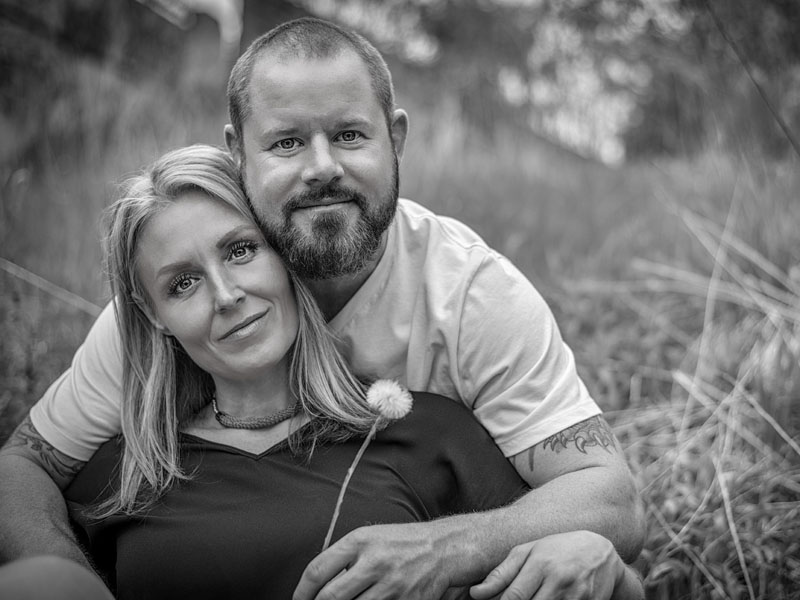Welcome! You are currently browsing the site as a guest. Please log in or create a free account to see more.
Don't Let Weight Gain Put a Strain On Your Marriage

Acknowledging the Importance of Attraction
In any marriage, physical attraction often plays a key role in building and maintaining intimacy. It’s not just about the way you or your partner look, but how this aspect ties into your overall connection. As we navigate through life together, changes in weight and physical appearance can naturally occur due to various factors like stress, job changes, or even starting a family. When these changes happen, it can lead to tension if not addressed with care and understanding.
The Impact of Weight Gain on Relationships
Weight gain can sometimes become a sensitive topic, stirring up feelings of insecurity or resentment. It's crucial to recognize that such changes are common and can happen to anyone. Moreover, these changes can impact not just how we feel about ourselves, but how we interact with our partners. When one partner feels uncomfortable in their skin, it can lead to distance between you, leaving unaddressed feelings lingering beneath the surface.
Open Conversations for Stronger Bonds
Addressing issues related to weight gain or lifestyle changes might feel daunting, but tackling these conversations with love and empathy can greatly strengthen your marriage. Instead of approaching the subject with harsh words or ultimatums, consider creating a supportive environment where you can both express your feelings openly. Focus on shared goals, like cooking healthy meals together or exercising as a couple, rather than focusing solely on appearance. This collective journey can enhance intimacy, trust, and ultimately fortify your bond as partners.
Understanding the Connection Between Weight Gain and Marriage
Weight gain within the context of marriage can be more than just a physical change; it often signifies shifts in emotional and relational dynamics. As couples navigate life together, various factors like lifestyle changes, stress, and new routines can lead to weight fluctuations. Understanding these influences is crucial for maintaining a strong and open partnership.
The portrayal of physical appearances can significantly impact how partners relate to one another. When one partner experiences noticeable weight gain, it might affect their self-esteem and confidence. This change can unintentionally create distance in the relationship, as partners may struggle to initiate intimacy or communicate openly about their feelings. It's essential to realize that a change in appearance doesn’t equate to a change in love or commitment; however, acknowledging and addressing these feelings is vital for nurturing closeness.
Weight gain introduces various stressors that can challenge even the healthiest of marriages. For instance, decreased intimacy can emerge when partners feel uncomfortable in their bodies, leading to hesitation in connecting physically. Additionally, weight-related health concerns can amplify anxieties about the future and spark discussions that might feel threatening. Addressing these issues directly can prevent misunderstandings and foster deeper communication.
In the face of these challenges, it’s so important for couples to prioritize their relationship and support each other through these changes. By openly discussing feelings surrounding weight gain and focusing on mutual well-being, couples can strengthen their bond and work collaboratively towards healthier lifestyles together.
The Psychological Effects of Weight Gain on Couples
Weight gain can have a profound impact on a marriage, often leading to unexpected psychological challenges for both partners. When either spouse experiences significant changes in their body, it can affect self-esteem in ways that ripple throughout the relationship. Feeling less attractive can lead to insecurities that create a distance between partners, making open communication difficult.
It's common for one partner to struggle with feelings of resentment or loss of attraction, and this emotional barrier can heighten tensions. Couples might find themselves avoiding intimacy, which in turn exacerbates feelings of isolation and disconnect. When one or both partners are unhappy about the changes in their bodies, it can evolve into a cycle of blame and negativity that pushes couples apart rather than bringing them together.
Moreover, societal standards of beauty can further complicate perceptions within a marriage. Each partner may feel pressured by media portrayals of ideal body images, which can lead to unrealistic expectations of themselves and their significant other. When these expectations aren’t met, frustration can arise. It’s crucial to recognize that every body is unique, and maintaining a healthy marriage means embracing each other’s physical changes with love and understanding.
To mitigate these psychological effects, couples should consciously cultivate an environment of support. Encouraging each other to engage in healthy activities, while also enforcing open conversations about feelings and expectations, can strengthen the bond. Ultimately, it’s about finding beauty in every shape and size—and building a relationship where both partners feel valued and appreciated, regardless of the scale's reading.
Navigating the Topic of Weight Gain with Sensitivity
Bringing up weight gain with your spouse can feel like navigating a minefield. It's essential to approach this topic with care to avoid unnecessary hurt feelings. The first step is to choose the right moment – find a calm, private space where both of you can talk openly without distractions. This shows that you value the conversation and your spouse's feelings.
When you bring up the subject, aim for a tone of empathy and understanding. Instead of diving straight into concerns about weight, express your love and care for their health and well-being. You might say something like, "I want us to support each other in living our healthiest lives together." This shifts the focus from appearance to lifestyle and health, which is a more positive and constructive approach.
It’s crucial to frame your concerns around a shared journey towards better health rather than pointing fingers at your spouse's choices. You could suggest preparing healthy meals together or exploring fun outdoor activities that encourage physical activity while still allowing you to bond. This way, the conversation isn't about blaming each other but about working together as a team.
By emphasizing your love and acknowledging that weight management can be a sensitive issue for both partners, you create an atmosphere of trust. Remember, your intention is to uplift and motivate, not to criticize. This gentle, thoughtful approach can transform a potentially awkward discussion into a meaningful, supportive dialogue that strengthens your relationship.
Constructive Conversations
When it comes to discussing sensitive topics like weight gain, open lines of communication can be a game-changer in marriage. Instead of letting worries fester, take a proactive approach to talk about it. Setting aside an uninterrupted time to chat can help both partners feel at ease. It’s important to frame the conversation around love and concern rather than criticism. Remember, you're a team, and the goal is to support each other through life’s ups and downs.
When expressing concerns, try to maintain a positive perspective. Instead of starting with a statement like, "You’ve gained weight," you could say, "I’ve noticed we’ve both been enjoying comfort food a bit more lately; how do you feel about that?" This way, you’re sharing feelings and observations without placing blame. Being empathetic and understanding can also go a long way—listening actively to your partner's feelings can make them feel valued and safe in the conversation.
The importance of constructive feedback cannot be overstated. When giving feedback, focus on what can be changed together as a couple, rather than pointing out individual shortcomings. For example, suggest going on walks together or trying out new healthy recipes as a couple. These shared activities can turn potential pitfalls into opportunities for growth and bonding.
By making conversations about weight gain supportive rather than critical, you foster a nurturing environment. This not only helps address the issue at hand but also strengthens the emotional connection in your marriage. Remember, it’s about growing together through every season of life.
Sharing the Journey
In any marriage, facing challenges together can strengthen your bond, and managing weight gain is no exception. It's essential to remember that you're not in this alone. Partnering up to address changes in weight and overall health can bring you closer and make the journey more enjoyable.
Start by incorporating joint activities into your routine that promote healthy living. You could cook together, experimenting with new recipes that are both nutritious and delicious. Trying out different cuisines can also add an element of fun to meal prep. As you chop veggies and stir pots side by side, you're not just preparing a meal; you're cultivating teamwork and communication.
Exercise is another fantastic avenue for shared growth. Consider taking brisk walks after dinner, going for bike rides on weekends, or joining a local dance class. Not only do these activities help improve your physical health, but they also create shared memories, laughter, and lots of quality time together.
Celebrating each other's successes, no matter how small, is crucial in this journey. Perhaps it’s a little prize for reaching a weight goal or a special dinner out after a month of healthy living. Recognizing progress encourages motivation and shows that you are both invested in each other’s well-being.
Ultimately, it's about fostering a supportive environment where you both feel empowered to make positive changes. By sharing your journey, you'll not only manage weight gain more effectively but also deepen your connection and strengthen the foundation of your marriage.
Creating a Healthy Home Environment
When it comes to navigating weight gain in marriage, creating a healthy home environment can make all the difference. A few practical tips can help revamp your household diet and promote better eating habits for both partners. Start by stocking the kitchen with fresh fruits, vegetables, whole grains, and lean proteins. Ditching the processed snacks and sugary drinks will not only improve your health but also inspire each other to make healthier choices.
Your lifestyle choices significantly impact long-term health and relationship satisfaction. Cooking meals together can become a cherished routine while allowing you to experiment with nutritious recipes. This encourages communication and teamwork, turning meal preparation into a fun activity rather than a chore. Plus, it gives you both the chance to have a say in what goes on your plates, making it easier to stick to healthier options.
Another vital aspect of cultivating a supportive atmosphere involves setting shared goals. Consider starting a weekend exercise routine, such as hiking or cycling, which can strengthen your bond while boosting your fitness. Celebrate small victories together, whether it's trying out a new healthy recipe or completing a workout challenge. Positive reinforcement goes a long way in motivating each other.
Lastly, keep the lines of communication open. Talk about your feelings regarding body image and wellness, creating a safe space for vulnerability. By prioritizing your health together, you're not just reducing the risk of weight gain, but also building a stronger foundation for your relationship. Embrace this journey as a couple, and watch how it enhances both your well-being and your connection.
Recognizing When Professional Help is Needed
Sometimes, despite our best efforts, managing weight gain in a marriage can become overwhelming. It's essential to recognize when the issues at hand may require professional help. Signs that you may need counseling include constant arguments about weight, feelings of resentment, or emotional distress tied to body image and health. These challenges can strain not just your individual well-being, but also the health of your marriage.
Seeking professional guidance can be incredibly beneficial. A licensed therapist can provide a neutral space to discuss underlying feelings, while a nutritionist or dietitian can offer practical advice on healthy eating. Couples who engage in this type of support often find that it brings them closer together, fostering open communication about their needs and aspirations. Sharing this journey can help couples unite around a common goal rather than perceive it as a source of conflict.
There are numerous resources available for couples facing these challenges. Many communities offer workshops and support groups focused on nutrition, fitness, and emotional well-being. Additionally, online platforms provide access to various programs designed specifically for couples navigating weight issues together. It's essential to remember that asking for help is a sign of strength and commitment to your relationship.
Fostering Open Communication
By prioritizing open communication and mutual support, married couples can effectively address weight gain and its potential impact on their relationship. Tackling these issues proactively not only strengthens the bond between partners but also builds a foundation of trust and understanding. When love, support, and commitment are placed at the forefront, couples can navigate life's challenges together, emerging even stronger.
Welcome! You are currently browsing the site as a guest. Please log in or create a free account to see more.








